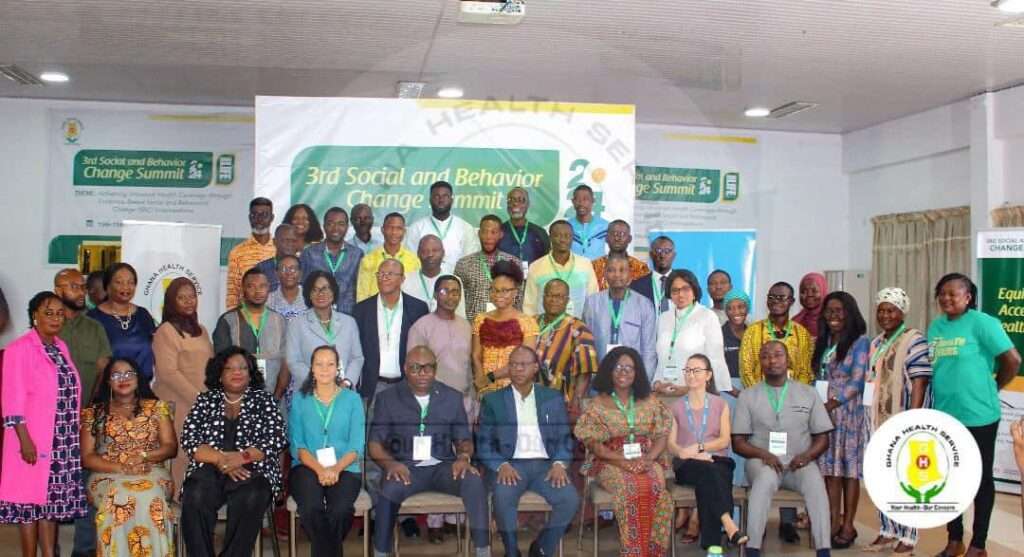In the ongoing pursuit of Universal Health Coverage (UHC), the integration of evidence-based Social and Behavioral Change (SBC) interventions has emerged as a pivotal strategy to drive sustainable health outcomes.
Dr. Patrick Kuma-Aboagye, the Director General of the Ghana Health Service (GHS), has underscored the indispensable role of these interventions in a recent address. Speaking at the opening of the third Social and Behavioral Change Summit 2024 in Accra, Dr. Kuma-Aboagye highlighted the transformative potential of SBC in the fight against preventable diseases such as malaria, hypertension, diabetes, tuberculosis, and diarrhoea.
“The journey towards achieving UHC through evidence-based social and behavioral change interventions is both moral and a strategic imperative.”
Dr. Patrick Kuma-Aboagye, the Director General of the Ghana Health Service
The summit, organized by the GHS offered an opportunity to forge partnerships, develop actionable plans, and commit to driving change within their respective spheres of influence. The significance of such a gathering cannot be overstated, especially in a world where health disparities are increasingly visible, and the quest for UHC remains an urgent challenge.
In his address, Dr. Kuma-Aboagye emphasized the need for collaborative efforts across all sectors, including health, education, and policymaking, to achieve UHC. He pointed out that the road to UHC is fraught with challenges, such as financial constraints, infrastructure gaps, and socio-cultural barriers.
However, these challenges also present immense opportunities for innovation and progress. “Today, we have at our disposal unprecedented tools and knowledge to catalyze change,” he stated, urging stakeholders to harness these opportunities and confront challenges head-on.
Data-driven SBC interventions are at the heart of this effort. By analyzing behavioral patterns and health trends, these interventions can be tailored to address specific community needs, ensuring that the strategies implemented are both effective and sustainable.
For instance, targeted campaigns to promote the use of mosquito nets in malaria-endemic regions, or community-based initiatives to raise awareness about the dangers of hypertension, are examples of how data can be leveraged to create impactful health interventions.
Dr. Kuma-Aboagye also highlighted the importance of fostering partnerships and embracing innovation in the journey toward UHC.
“By fostering partnerships and embracing innovation, we can create resilient health systems that leave no one behind,” he said. This sentiment was echoed by development partners such as UNICEF, USAID, and The Hunger Project, who reaffirmed their support for Ghana’s SBC initiatives.
These partnerships are crucial in mobilizing resources, scaling effective interventions, and advocating for policies that prioritize health equity.
Innovation in SBC interventions is not limited to technology but also extends to community engagement strategies. Engaging with marginalized populations, understanding their unique challenges, and co-creating solutions with them are essential steps in ensuring that no one is left behind.
The use of mobile health platforms to deliver health information, the deployment of community health workers to remote areas, and the development of culturally sensitive health campaigns are all examples of how innovation can drive progress in SBC interventions.
UHC as a Beacon of Equity and Justice

The Director General described UHC as a beacon of equity and justice in healthcare systems worldwide. It offers the opportunity for individuals and communities to access essential health services without financial hardship.
“In a world where health disparities are ever more visible and where the quest for Universal Health Coverage remains a pressing challenge, our summit serves as a beacon of hope and a catalyst for change.”
Dr. Patrick Kuma-Aboagye, the Director General of the Ghana Health Service
However, achieving UHC requires a comprehensive approach that addresses both the supply and demand sides of healthcare delivery. On the supply side, this involves improving healthcare infrastructure, ensuring the availability of essential medicines, and training healthcare professionals.
On the demand side, it requires changing health behaviors, improving health literacy, and empowering individuals to take charge of their health.
SBC interventions are critical in addressing the demand side of healthcare delivery. By shaping health behaviors, influencing policy, and improving health outcomes, these interventions play a key role in the success of UHC.




















